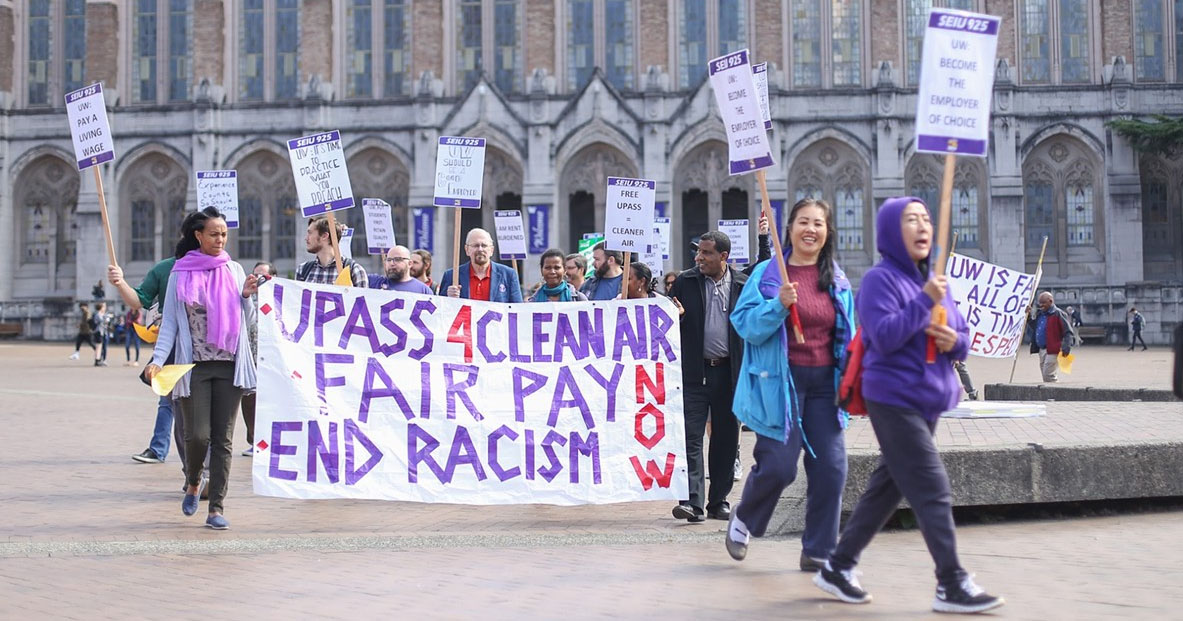OPINION
It may take time, but when we fight, we win
How SEIU 925, UAW 4121 and allies won free transit passes for UW employees
By RHONDA JOHNSON, SAM SUMPTER and MATT WEATHERFORD
(July 29, 2022) — Starting July 1, all employees of the University of Washington received an unlimited, employer-paid transit pass.
It’s hard to think of a better policy for this moment. Just last fall, our regional light rail system finally extended into the heart of the U-district and up to Northgate, greatly expanding fast, frequent transit service to the UW campus. In-person work is resuming, and transit agencies are desperate for riders to return after over two years of pandemic-depressed ridership. And, with the latest report from the Intergovernmental Panel on Climate Change warning that we are in a “now or never” moment to limit global warming, shifting to sustainable transportation has never been more urgent, given that transportation accounts for our city’s and state’s largest contribution to carbon emissions by a mile.
But this isn’t a simple story of an enlightened employer stepping up to do the right thing. It took a years-long struggle by UW workers, labor unions, community groups, and transit and environmental advocates to achieve this progress.
In fact, the University of Washington has lagged behind its peers. When the coalition that fought for this benefit first came together, many other major employers already provided a universal ORCA pass as a standard employee benefit: King County and the City of Seattle; Swedish Hospital and Seattle Children’s Hospital; Seattle Pacific University; Microsoft and other tech companies.
At the UW, by contrast, employees who wanted a transit pass had to pay about $50 a month. This affected employee commute choices. As Rosemary Bryson, a Patient Services Specialist at UW Medical Center, explained at the time: “I drive every day. I have 12-hour days. I would like to have the option to take a bus or train some days, but I can’t afford a U-PASS and drive. But I need to drive some days.”
Not surprisingly, 40% of UW staff and faculty opted not to spend $50 of their paycheck each month on a transit pass. Over a third of employee commute trips were single-occupancy vehicle (SOV) trips, adding to the UW’s carbon footprint and making traffic congestion worse.
That’s why labor unions such as SEIU 925 and UAW 4121 joined with groups such as the Sierra Club and the Transit Riders Union to push the University of Washington to do better.

The story goes all the way back to 2016, when the UW was beginning the public process to update its Seattle Campus Master Plan. Since the planned long-term expansion of the university would have major impacts, unions and community allies saw a chance to push for improvements that would truly benefit workers and the wider community.
By 2018, employer-paid transit passes had crystallized as one clear demand. UW workers and community allies held rallies, stopped traffic, wrote letters, enlisted the support of elected officials, delivered petitions, and testified at meetings. At the same time, unions representing different parts of the UW workforce made transit passes a priority in bargaining their contracts. And even after winning the free U-PASS in negotiations, campus unions had to mobilize and seek third party grievance arbitration when UW tried to back out of its commitment to provide the benefit to all members.
With sustained pressure from the inside and the outside, by the end of 2019 nearly all unionized UW employees had successfully bargained this benefit. But that still left behind over 10,000 non-union professional staff and faculty. So the coalition kept pushing.
Finally, late last year, the University of Washington announced that it would consider extending fully subsidized transit passes to all employees. The final decision was made at the Board of Regents meeting this March, and the benefit takes effect on July 1.
The moral of this story is that progress doesn’t happen without a fight. It’s a lesson that’s been demonstrated a lot lately. We’re seeing hometown company Starbucks resist a new upsurge of worker organizing, even while enhancing worker benefits in response to the pressure. Amazon’s “Climate Pledge” suddenly arrived when tech workers at the company organized and walked out en masse. And at the University of Washington, several groups of non-union employees, from librarians to research scientists, have recently voted to unionize, recognizing the power that comes from collective action.
The bosses don’t give us things out of the kindness of their hearts, they respond to pressure. And, though it can take a long time, when we fight, we win!
Rhonda Johnson is a Patient Service Specialist at the University of Washington Medical Center and current president of SEIU 925’s UW chapter. Sam Sumpter is the President of UAW 4121, the union of over 7000 academic workers at the University of Washington. Matt Weatherford served on the University Transportation Committee for more than 10 years, representing the Professional Staff Organization at the University of Washington, and is a member of the Transit Riders Union. This column was originally posted by The Stranger and is crossposted here at The Stand with the authors’ permission.






